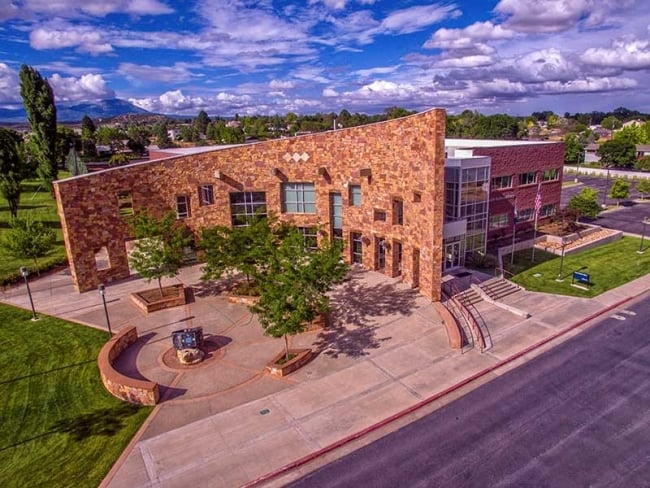You have /5 articles left.
Sign up for a free account or log in.

Students at USU Blanding can receive mental health support from peer leaders.
Utah State University at Blanding
While many college students experience stress, anxiety and loneliness, few of them engage with campus resources, instead preferring to turn to their friends or family for support.
Administrators at Utah State University at Blanding launched a peer mental health network to encourage students to seek resources and services and provide culturally relevant care. The initiative, featured at NASPA’s Conferences on Student Success in Higher Education in Anaheim, Calif., last month, benefits students in establishing paid leadership opportunities, creating on-campus engagement and improving community conversations around mental health.
The background: Until 2023, USU Blanding lacked an on-campus counseling and psychological services office, meaning students had limited access to mental health care and resources in an in-person setting, explained Priscilla Arungwa, director of student services.
The university became a JED Foundation Campus in 2020, and a program review highlighted several needs on campus, including screening and wellness days, shorter waits to meet with an off-campus therapist, and peer mentoring.
A 2022 Health Minds Survey at USU Blanding found students were most likely to turn to their family, friends, significant other or roommate for mental health support, indicating student preferences for near-peer care. USU Blanding’s student population is 70 percent Indigenous, also creating a need for culturally competent care.
Staff applied for a $40,000 Multicultural Rural Mental Health grant through the Utah Division of Multicultural Affairs to start the peer support program, which funds student wages and on-campus programming and relevant supplies.
How it works: The Peer Mental Health Support Network consists of four peer ambassadors who hold different roles based on their skills. Some complete administrative work, others organize events and outreach, and others work directly with peers on mental health issues.
For the past few years, most of the work students have done is outreach and educational events, including tabling, creating stress relief or self-care kits, mental health first aid training, or a mental health awareness movie night. Peer leaders create their own posters and social media posts to advertise events, and they hold workshops and make classroom visits to build awareness of their services.
Students also provide one-on-one wellness support to peers identified by early alert or flagging systems on campus. Together, the peer leader and referred student will develop a wellness recovery action plan to address their mental health concerns.
As needed, students will provide referrals and crisis response to relevant parties and help educate staff and others on campus about mental health for Indigenous learners.
Peer mentors earn $15 an hour and work around 20 hours a week, in person and remotely. Students with relevant majors were recruited to apply, and anyone with passion or interest could hold the role, Arungwa said.
Student leaders not only gain expertise in mental health support, they also participate in career development led by their supervisor tied to the National Association for Colleges and Employers’ eight career competencies.
Lessons learned: Due to the nature of the role, staff learned they had to be flexible with students’ work hours and accommodate for breaks they may need to support their own mental health. During weekly team meetings, students perform mental health and academic check-ins with one another and their supervisor.
Maintaining funding is also a priority for campus staff. Some of the students’ work is focused just on data entry and presentation for grant management, which provides them on-the-job training for future projects.
One of the key facets of the program is making sure events are student led, Arungwa says. While she and other staff are there to support, letting peer mentors engage and be the faces of the program encourages help-seeking and makes students recognizable figures around campus.
The impact: A collegewide survey conducted after the program was implemented learned:
- Ninety percent of students know where to go for mental health supports.
- Fifty percent of students feel like they can talk to peers about hard topics.
- Forty-seven percent have struggled with mental health in the past.
- Twenty-five percent of students had been feeling down within the past two weeks.
- Fifteen percent of students felt they were doing poorly with mental health.
Staff relied on data collection to determine what events were popular and which students were attending, helping provide direction for future planning. Social media analytics and survey data were also taken into account, helping paint a fuller picture of student desires.
In the future, Arungwa hopes to provide more early outreach for events and integrate campus staff and faculty into the offerings, both elements that students asked for.
If your student success program has a unique feature or twist, we’d like to know about it. Click here to submit.




